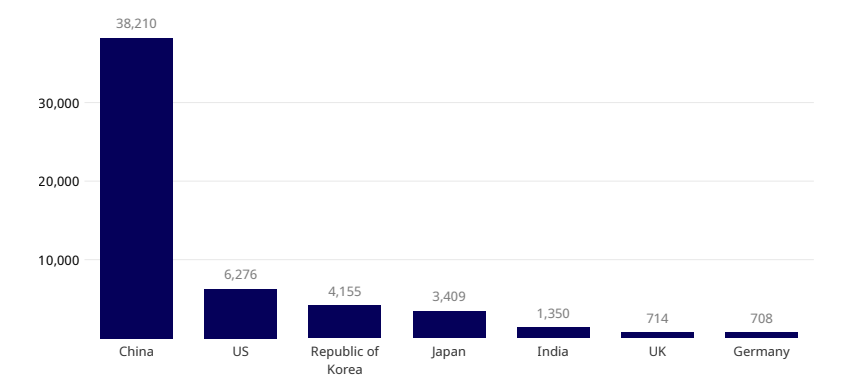
India ranks fifth globally in terms of the number of Generative AI (Gen AI) patents published between 2014 and 2023 as highlighted in World Intellectual Property Organization’s (WIPO) recent report.
The report, Patent Landscape Report on Generative Artificial Intelligence, states that between 2014 and 2023, India filed more than 1,500 GenAI patent families for seeking patent protection, leaving behind advanced countries like the UK and Germany.
Globally, Gen AI is revolutionizing various industries by enabling the creation of new content, improving productivity, and fostering innovation. China is leading the way in Gen AI patents, followed by the United States, and notable contributions from countries like the Republic of Korea, Japan, and India.
Between 2014 and 2023, the number of published GenAI patent families globally increased from fewer than 800 to over 14,000 annually. This growth is driven by advancements in deep learning, the introduction of transformer models in 2017, and the release of ChatGPT in 2022, showcasing the vast potential and versatility of GenAI models.

Figure 1: Key patent families in GenAI, 2014–2023
Key highlights of India’s achievements include:
- Patent Growth: India stands out with a remarkable annual growth rate of 56% in Gen AI patent filing, the highest in the world, although its total number of patents is still relatively small.
- Research Focus: India has an above-average share of all GenAI patent families in networks and smart cities, which indicates a strong focus on urban infrastructure and connectivity.
- Text-Based GenAI: A substantial portion of India's GenAI patent families are based on text data, showcasing the country's expertise in developing language models and text processing technologies; and,
- Top Domains: India’s top domains are software followed by life sciences, business solutions, industry and manufacturing, and document management and publishing.

Figure 2: India’s top GenAI patent domains
India’s annual growth rate in Gen AI patent families over the decade maybe an indication that the country can become a significant player in the coming years. With continued investments in research and innovation, as well as evolving intellectual property protection, India can further contribute to the development and application of GenAI technologies in various domains.
Although GenAI is still a relatively small part of the overall Artificial Intelligence research activity globally, it is worth noting that the share of GenAI patent publications has been increasing. In 2017, the GenAI share was 4.2%, and it has steadily risen to 6.1% in 2023.
This upward trend suggests that GenAI is slowly becoming more significant within the broader field of AI patenting. Additionally, emerging applications in agriculture, energy management, and healthcare promise to further integrate GenAI into daily life, driving substantial economic impact. The WIPO report cites a recent McKinsey study that estimates that GenAI could contribute between USD 2.6 trillion and USD 4.4 trillion annually across various industries.
About the WIPO Report:
The WIPO report provides observations on patenting activities and scientific publications in the field of GenAI and identifies key research countries, companies, and organizations. They have identified top countries who are leading the way in adopting this technology and securing it through patent families, between 2014 to 2023.

